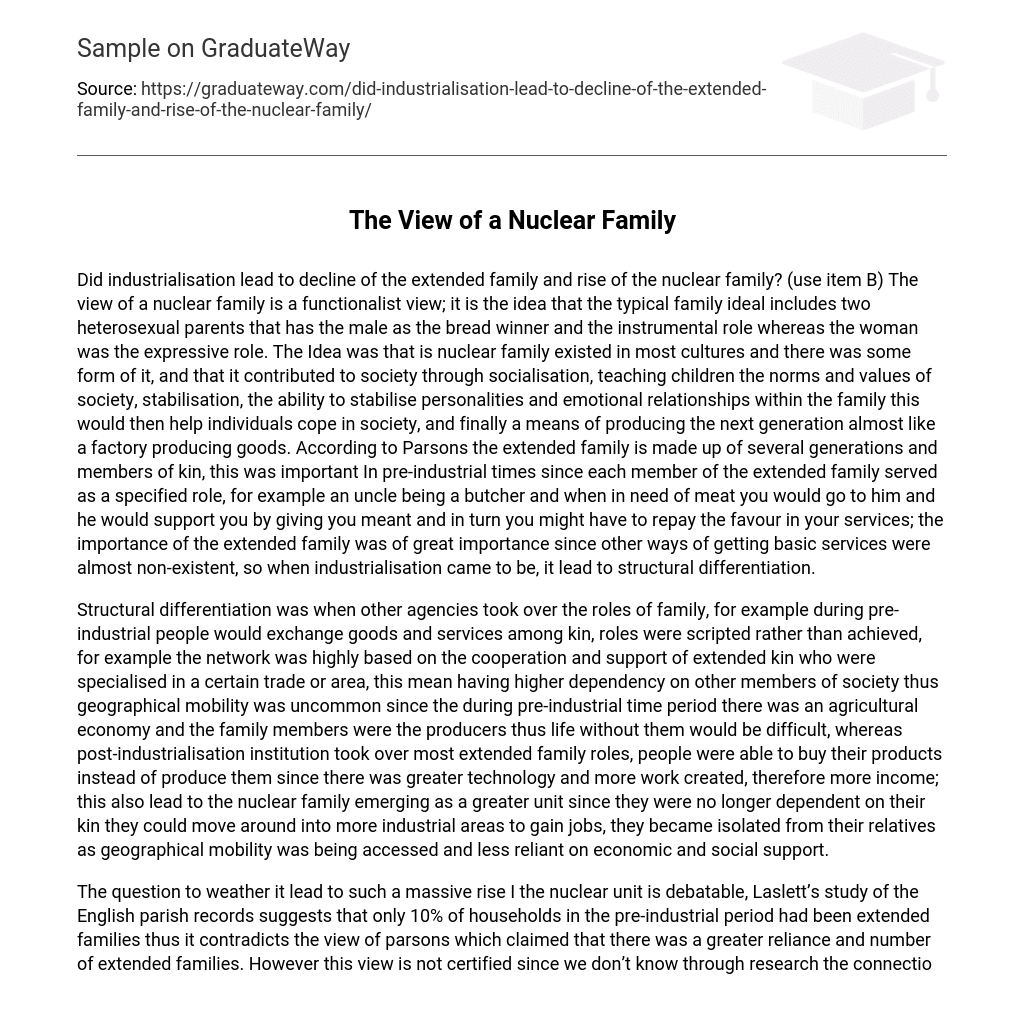Did industrialisation lead to decline of the extended family and rise of the nuclear family? (use item B) The view of a nuclear family is a functionalist view; it is the idea that the typical family ideal includes two heterosexual parents that has the male as the bread winner and the instrumental role whereas the woman was the expressive role. The Idea was that is nuclear family existed in most cultures and there was some form of it, and that it contributed to society through socialisation, teaching children the norms and values of society, stabilisation, the ability to stabilise personalities and emotional relationships within the family this would then help individuals cope in society, and finally a means of producing the next generation almost like a factory producing goods. According to Parsons the extended family is made up of several generations and members of kin, this was important In pre-industrial times since each member of the extended family served as a specified role, for example an uncle being a butcher and when in need of meat you would go to him and he would support you by giving you meant and in turn you might have to repay the favour in your services; the importance of the extended family was of great importance since other ways of getting basic services were almost non-existent, so when industrialisation came to be, it lead to structural differentiation.
Structural differentiation was when other agencies took over the roles of family, for example during pre-industrial people would exchange goods and services among kin, roles were scripted rather than achieved, for example the network was highly based on the cooperation and support of extended kin who were specialised in a certain trade or area, this mean having higher dependency on other members of society thus geographical mobility was uncommon since the during pre-industrial time period there was an agricultural economy and the family members were the producers thus life without them would be difficult, whereas post-industrialisation institution took over most extended family roles, people were able to buy their products instead of produce them since there was greater technology and more work created, therefore more income; this also lead to the nuclear family emerging as a greater unit since they were no longer dependent on their kin they could move around into more industrial areas to gain jobs, they became isolated from their relatives as geographical mobility was being accessed and less reliant on economic and social support.
The question to weather it lead to such a massive rise I the nuclear unit is debatable, Laslett’s study of the English parish records suggests that only 10% of households in the pre-industrial period had been extended families thus it contradicts the view of parsons which claimed that there was a greater reliance and number of extended families. However this view is not certified since we don’t know through research the connection or dependence these nuclear families had with their kin, thus people could have lived in nuclear families but visited and spent time with other relatives every day. Anderson’s study on the industrialised town of Presto, using census records of 1851 suggested that even though post industrialised there were large numbers of families that pulled together money in poorer places to distribute it to their kin. However this view is of only one town and cannot be applied universally, thus making it less useful. Young and Willmott disagree with parsons on the idea of the change between extended and nuclear being instant but they support the idea of it happening gradually since some of his research suggests that even during the advanced stages of industrialisation, there were families who were extended. This extended kinship was based upon emotional attachment and obligation rather than financial and economic support. Young and Willmott argue that the extended family unit went into decline In the 1960s when working class communities were rehoused in new towns and on council estates after extensive slum clearance.
Therefore the well fare states and full employment undermined the need for a mutual economic support system since young educated men were able to take advantage of the freedom of geographical mobility and required less financial support since they were able to social move to whit-collar jobs rather than manual labour, thus having to move into cities were housing was not fully accommodated to house more than a small number of people. Overall the decline in the extended family is clearly seen due to industrialisation since as the era progressed, the support financial and emotional was becoming less needed with technology and factories coming into place people moved to places with more job opportunities which then lead to ties being cut so geographical mobility could have been fully employed. Therefore the nuclear family best benefited this society and the structure was needed for people to survive so they adapted to it and became nuclear since the nuclear family was best suited both economically and socially.





